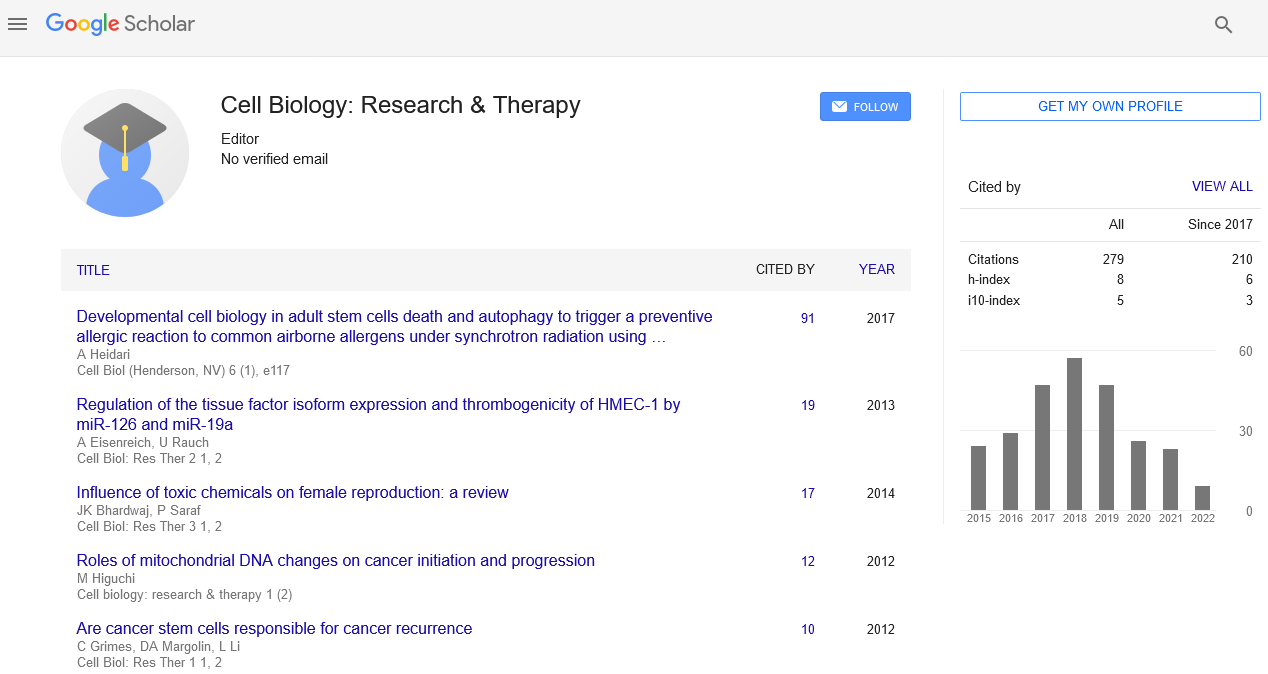Perspective, Cell Bio Vol: 12 Issue: 1
Reproductive Cloning: Ethical and Legal Implications
Malin Wert*
1Department of Large Animals Diseases and Clinic, Warsaw University of Life Sciences, Warsaw, Poland
*Corresponding Author: Malin Wert
Department of Large Animals Diseases and
Clinic, Warsaw University of Life Sciences, Warsaw, Poland;
E-mail: wertmalin@slw.edu.pl
Received date: 21 February, 2023, Manuscript No. CBRT-23-93179;
Editor assigned date: 23 February, 2023, Pre QC No. CBRT-23-93179(PQ);
Reviewed date: 07 March, 2023, QC No. CBRT-23-93179;
Revised date: 14 March, 2023, Manuscript No. CBRT-23-93179(R);
Published date: 24 March, 2023, DOI: 10.4172/2324-9293.1000168
Citation: Wert M (2023) Reproductive Cloning: Ethical and Legal Implications. Cell Biol 12:1.
Description
Reproductive cloning is a technique that involves the production of an organism that is genetically identical to another. This technique has been used to clone various animals, such as sheep, cats, and dogs, and it has the potential to be used for cloning humans. The ethical and legal implications of reproductive cloning are complex and multifaceted, and there is much debate surrounding the issue.
One of the main ethical concerns associated with reproductive cloning is that it involves the creation of life solely for the purpose of satisfying the desires of individuals or groups. This can be seen as a violation of the inherent dignity of human life and a form of exploitation. Critics argue that the use of cloning for reproductive purposes raises fundamental questions about the nature of human identity, the relationship between parent and child, and the meaning and value of life itself.
Another ethical concern associated with reproductive cloning is the potential for harm to the cloned individual. Research has shown that cloning can result in a range of physical and psychological problems, including shortened lifespans, increased rates of cancer and other diseases, and abnormal behavior. There are also concerns about the psychological impact of being a clone, including the potential for identity confusion and social stigma.
In addition to ethical concerns, there are also legal implications associated with reproductive cloning. In many countries, the use of cloning for reproductive purposes is either explicitly prohibited or heavily regulated. In some cases, the use of cloning for research purposes is allowed, but the creation of a cloned individual is not. This reflects the complex legal and ethical considerations involved in balancing the potential benefits of cloning with the risks and harms that may result.
One of the key legal concerns associated with reproductive cloning is the potential for exploitation and abuse. There is a risk that the technology could be used to produce individuals for specific purposes, such as military or economic gain, or to satisfy the desires of wealthy or influential individuals. This could result in a situation where some individuals are treated as commodities or objects rather than as persons with inherent dignity and value.
Another legal concern associated with reproductive cloning is the potential for infringement of human rights. Cloning raises questions about the right to privacy, the right to bodily integrity, and the right to reproductive freedom. In some cases, these rights may conflict with one another, making it difficult to determine the appropriate legal response.
Conclusion
In conclusion, reproductive cloning raises complex ethical and legal issues that require careful consideration and debate. While there are potential benefits associated with the technology, such as the ability to create genetically identical individuals for medical or scientific purposes, there are also significant risks and harms that must be addressed. The psychological impact of the clone, and the potential for exploitation of human cloning for commercial or eugenic purposes.
 Spanish
Spanish  Chinese
Chinese  Russian
Russian  German
German  French
French  Japanese
Japanese  Portuguese
Portuguese  Hindi
Hindi 